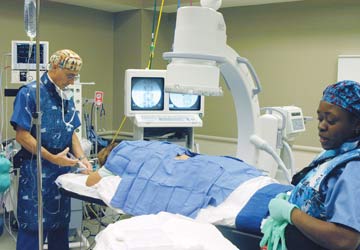Almost everyone agrees that epidural steroid injections seem to work. The questions are, how well do they work, what is the magnitude of the benefits and how long do they keep the pain at bay?
“When we offer patients steroid injections, we order an MRI first to see what the problem is. Then we can decide what sort of injections may be beneficial,” says Andrew Ng, MD, clinical assistant professor of anesthesia and pain management
at Jefferson University Hospitals in Philadelphia.
The epidural steroid injection is mainly for spinal stenosis, disc herniations or shooting pain down the legs, according to Dr. Ng. Typically, you can offer the injection the first time to see how well the patient does with it, then reassess the
patient in 2 weeks and see how much improvement they get from the injection. If the pain relief doesn’t last, the treatment can be repeated up to 3 times, says Dr. Ng.
“I have some patients, if I do one injection, it will last them for 2 years,” says Dr. Ng. “Some patients get better for 5 days, then we repeat, and they get better for 3 months. It varies depending on the problem and severity
of that problem. But on average, the injections last 3 to 6 months.”
Dr. Ng says the injections temporize the pain and make the patient more functional in the short term. And they’re an option if the patient doesn’t want to have surgery or isn’t a candidate for surgery. There is also a growing
appreciation for the risks associated with steroids.
“With repeat steroid injections, like into tendons, you can rupture the tendon,” says Dr. Cohen.
“It’s also now known that they increase bone mineral density, so it can expose people to osteoporosis. Whether that leads to fractures is still debatable because the evidence is mixed. And steroids can make diabetes worse in those
who have that.”
Dr. Ng adds that you should also be aware that another risk associated with epidural steroid injections is nerve damage to the patient. You can minimize that risk by reviewing the MRI and using fluoroscopy while performing the injections, he says.
Steroid injections usually work better for acute pain than chronic pain, says Dr. Cohen.
“Epidural steroid injections are the most common, and they clearly work better for people who have a relatively short duration of pain,” he says.
.svg?sfvrsn=be606e78_3)

.svg?sfvrsn=56b2f850_5)